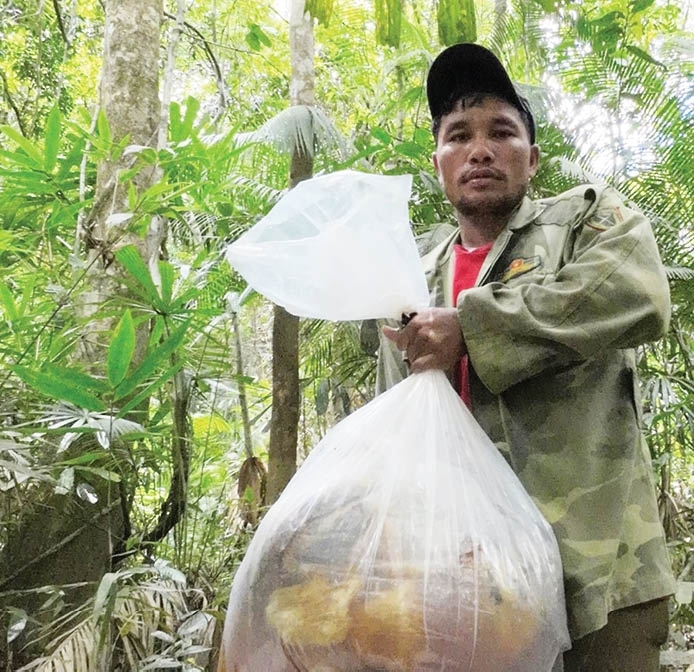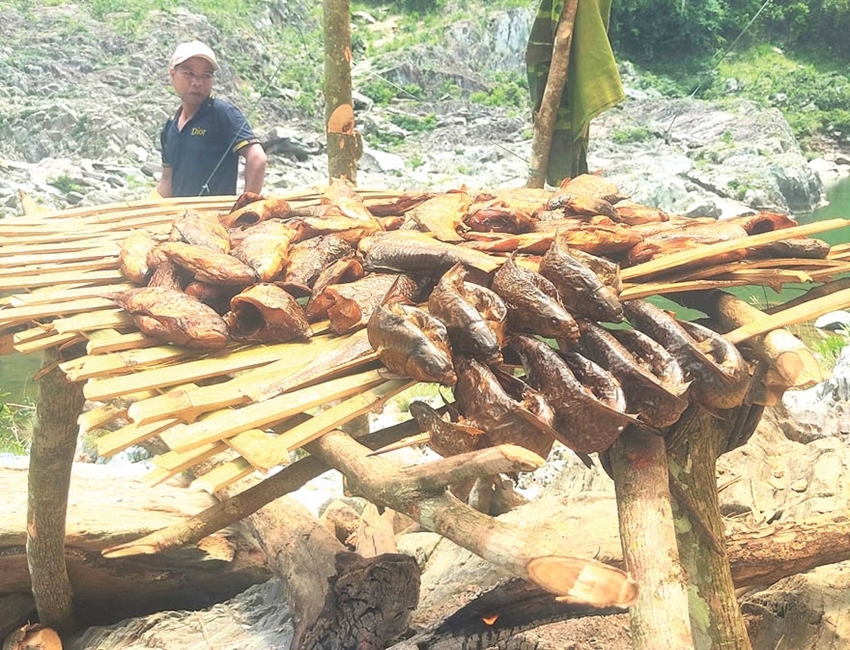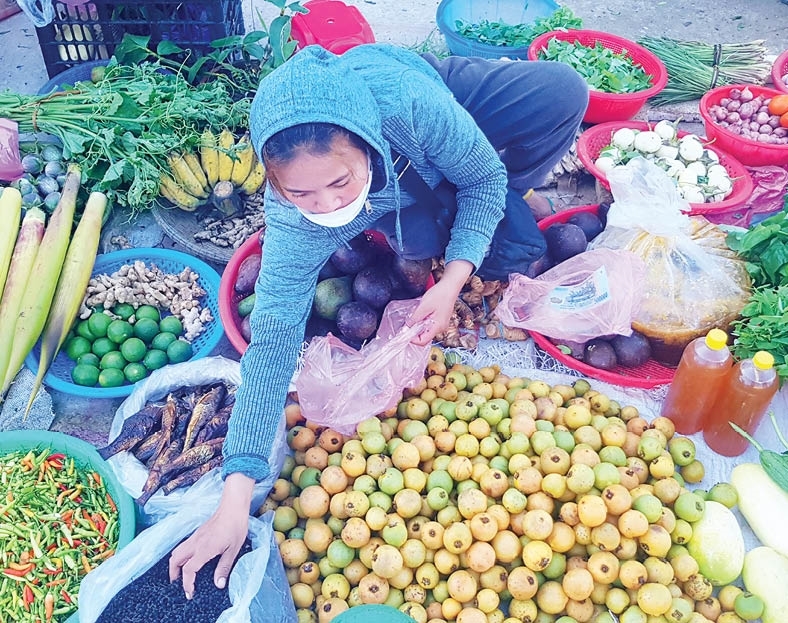Sweet honey makes people warm inside
The sudden thunderstorm made people rush to A Roang Tunnel for shelter. In the tunnel were many people taking a rest on their way back from the wood talking to each other.
Suddenly a loud voice destroyed the quietness: '”Anyone has honey to sell?” A man carrying a heavy bag on his shoulders approached her. He weighed his honey. The woman bargained. Six beehives were sold at the price of about VND1.5 million. “It's a bit cheaper than usual, but I won’t have to go to the market in town. I’m in need of money now, so I want to sell it wholesale,” said the man.
It was a group of 20 people that day, but only two of them had honey. Ho Van Rung looked happy with 8kg of honey on his shoulders. This time he didn’t need to sell it yet as he wanted to wait for a higher price.
“Not all people get honey every time they go to the wood. It took me two days in the forest to have this honey. Once in a while we are lucky enough to find some beehives. If not, we pick vegetables, bamboo shoots or collect snails in the stream instead,” said Rung.

Collecting honey
Everyone in Hong Kim Commune knows Nguyen Van Nam, in his 30s, is an excellent “forest man.” This Pa Kô man has a gift for searching for beehives. When asked, he laughed: ''I have some experience just because I’ve gone to the forest many times. I’m not that good.” By following bees when they fly find water to drink and observing traces that they leave on flowers Nam knows where their hives are.
He goes to the forest a couple of times a month. His longest trip lasted up to two weeks or even a month. July is when bees produce the most honey. He and his men once collected up to over 70kg of honey, which earned him the respect of many other honey collectors.
According to Nam’s wife Ho Thi Doan, when not occupied, she follows him to the forest. Now and then, when there is no one to take care of them, even their two kids join them. Though the trip is too hard for the children, they can’t let them stay home by themselves.
“Joining him, I feel love my husband even more. It’s such hard work. If we’re lucky enough, we have some honey to bring back. If not, we have to wait until the next trip,” confided Doan.

Catching and drying fish in the forest
Nam is a gentleman. He is quiet but careful and cautious. According to Nam, this work is too hard for women. Joining us they can help us with odd jobs. Then we men can focus on our main job. For each trip we have to spend lots of money on food, pots, electric torches, shoes, binoculars, etc. Last month, Nam and his friend Po went to the forest next to Quang Nam Province. They climbed up a big 50-meter-high tree to collect honey for 3 hours long. They stayed in a camp which they made for themselves. They just came back home only when they had collected much honey.
Sleeping on the mountains, “eating” dew and facing dangers
Brothers Nguyễn Văn Nơi and Nguyễn Văn Nối at Hong Kim earn their living by going to the forest. Their destinations are the woods at the water sources of Bo River, Lu Creek, A Sap Dam, and in the area next to Laos.
In case they cannot find honey, they turn to catching fish in streams, then dry them on site. Dried fish is sold at the price of VND280-300/kg. So, if they work hard, they can earn up to millions. March to August is also the time when medicinal mushrooms multiply. Recently, when more people go looking for them, mushrooms have become scarcer. Every time they pick mushrooms, they use a stick to mark the place and save some for the next season, not to exploit them thoroughly as before.
Among dangers that they face are broken trees, slipping and falling when crossing streams, snake bites, bloodsucking insects, etc., not to mention “eating” dew, sleeping on the mountains and exposing themselves to the sun and rain. Their career requires good health and endurance.
“This year there is lots of honey. We then have more money for mending our house. We don’t mind working hard, provided that the forest continues to grant us with benefits. This too hard work cost even people’s lives,” sagged his voice.

Selling doi seeds, banana flowers, honey, garcinias in A Luoi Town
Recently, a person in H.T. Commune fell from a tree and died while he was collecting honey. Last year, while the New Year’s Day was coming, a man in Trung Son while searching for bamboo shoots slipped by the waterfall and died, leaving his wife and small children.
Noi still remembers the story of Mr. N.N.Ng., a member of his group, went to A Roàng Forest to catch fish. Unfortunately, he was bitten by a rattlesnake in his leg. It took them the whole nigh through to carry him out of the wood to the commune clinic. The clinic didn’t have appropriate anti-toxic serum, so he was transferred to Hue Central Hospital for treatment for 1 week. After that trip, Ng. quitted his job, left the wood for the plain, working for a farm to support his family.
I myself had a memorable trip with Mr. Nguyen Van Khua in Quang Nham Commune to the wood to pick watercress. That day, we walked in a jungle so thick that the sun couldn’t get through. The only sounds we could hear were sounds of streams and birds. It took us 30 minutes by motorbike from A Bia Hill, then another hour of walking before we arrived at the area with watercress. Though watercress didn’t cost much, it helps Khua and his wife make ends meet during the summer.
On the way there we saw frightening snakes and bloodsucking insects. On the way out, we were exhausted without drinking water. We all lay down as if it was the end of the world. Fortunately, people came to our rescue. It was my first trip to the forest which I can never forget.
Honey is cheap when it is in season, just around VND200.000/1kg wholesale to merchants. Some people accept that cheap price to prepare for the next trip. Some store it. This time, Doan needed money to go to the doctor in Hue. Before the trip, she sold some bottles of honey to some people she knows.
“For our people, medicinal herbs, honey, etc., are like savings in case of need. They are money for their children’s schooling, repairing their houses, and other “big” work,” said she.
At this time of the year in A Luoi, visitors can buy a variety of things. Women sell bamboo shoots, vegetables, wild banana flowers while men sell medicinal mushrooms, honey, doi seeds.
Through what they sell, we can see the difference between men and women. Men often sell more valuable things because they spent more time in the forest. Women go to the forest just when they have some leisure time looking for something as food for their families and earn some extra money.
Mrs. Ho Thi Tanh, one of the sellers at the early market, is carefully straightening her money notes before putting them in the bag. “I went to the forest from 5am to 6pm and brought back 2 banana flowers, some galangal roots, a few kilograms of bamboo shoots. I earned nearly VND200.000. I save this money for buying books and clothes for my kids in the coming school year,’ smiled she.
Looking at Tanh's gentle smile and her rough hands with many scratches, I remembered the women with their bags on their shoulders whom I had met in the virgin forest last time. Deep in their big round eyes were their hopes of being “loved” by the forest and for a brighter day. Such hopes were perhaps their lasting motivation.